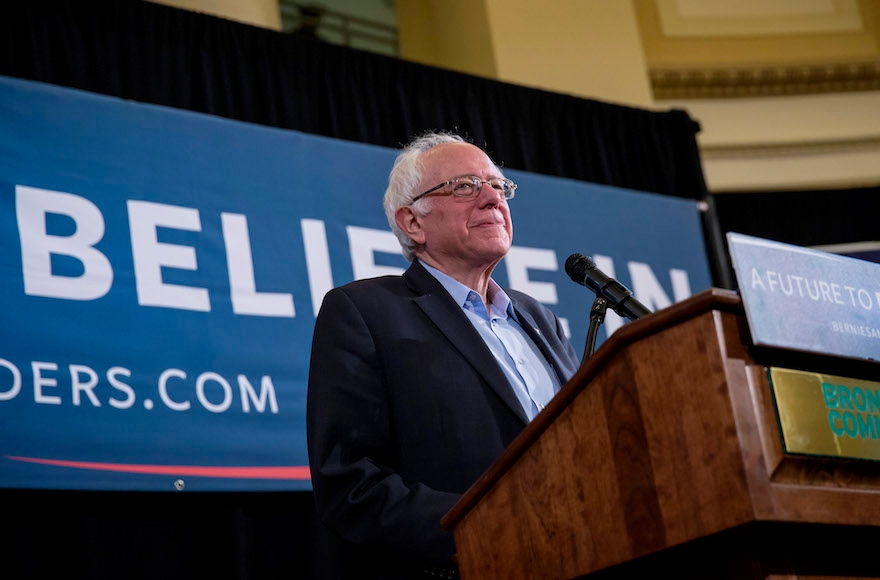(JTA invited supporters of the five leading Republican and Democratic contenders for their parties’ presidential nomination to submit opinion pieces in support of their candidate. Other responses can be found here.)
NEW YORK (JTA) — On Nov. 8, 2016, if Hillary Clinton is the Democratic nominee, I expect to be voting enthusiastically for Clinton for president. One reason is that she’s so competent. Another is that the Republicans are so awful. In fact, I can’t think of a modern-day Republican I’d prefer over Hillary Clinton with the possible exception of the late Jacob Javits.
Seriously, never have the Republicans been so wrong on so many things that matter: social equality, global warming, racial and gender inequality, reproductive rights, gun control, overseas adventurism, union rights and much more.
But on April 19, in the New York Democratic primary, I’ll be voting for Bernie Sanders. I’ve got three good reasons for doing so. Sanders is incomparably better on fighting for social equality. He’s more pro-Israel than Clinton. And he’s more electable.
Since the late 1960s, when I was a sociology student at Columbia, the distances among the rich, middle class and poor have, if anything, grown wider. Commensurate with the social gaps, the power of the small economic elite has also surged. And while I admire and praise some of them, including those within our community, for their charitable deeds and leadership, the growing gap has concentrated alarming levels of political influence and social isolation in the hands of the very few.
The evidence is everywhere, complementing the books and articles I’ve been reading since my undergraduate days. Just in the past week I’ve read how the gaps in life expectancy between rich and poor have been expanding, how by effectively suppressing competition in major industries a small number of hedge funds have been boosting consumer prices in those industries by 3-5 percent and how five enormous banks are still too big to fail lest they drag down the world economy.

Steven M. Cohen (Courtesy of Cohen)
Senator Sanders has made closing these gaps — between rich and poor, powerful and powerless, mainstream and marginal — the centerpiece of his campaign. I have no doubt the election of a President Sanders will give impetus to efforts to return tax rates on the rich to where they were during the prolonged economic boom between World War II and the 1970s. He’ll take important steps to expand the social safety net, to rein in major corporations, to restore workers’ rights and to improve the health of all Americans – not just those like me who have access to the finest medical care that education, access, insurance and money can and do provide. Hillary Clinton is fine on these issues (and much better than any living Republican), but Bernie Sanders is much better, and his election as president in and of itself will send a powerful message.
I said that Sanders is more pro-Israel than Clinton. Not more pro-Likud, or pro-Bibi, or pro-settlements, or pro-occupation – but pro-Israel. I’ve been a Zionist since my undergraduate days when we fought the anti-Israel left. I made aliyah in 1992, and my wife and I maintain an apartment in Jerusalem, where we live a good part of the year. My parents are buried in Har Menuchot, my daughter and her husband live in Tel Aviv.
The current policies of my democratically elected government are not good for Israel. They’re dangerous to Israel’s security and corrupting to its morality – and Israel’s security and morality go hand in hand.
It’s no wonder that the vast majority of Israel’s professional security establishment — former leaders of the Shin Bet, heads of military intelligence and army generals — have publicly taken issue with the major policy directions and inclinations of the people who’ve been heading the only Jewish state we have and treasure. Now they – and I – are in the minority in Israel. But the 61-59 split in the Knesset at least indirectly testifies to the deep fissures in the Israeli body politic, and to the major part of the minority that deeply differs with the current leadership.
Over the past eight years, President Obama has crafted a supremely pro-Israel policy. It has married expansion of security cooperation and military assistance to the highest levels in history, with enormous (and eventually unsuccessful) investment in bridging Israeli-Palestinian differences along with pressure on the Israeli government to restrain settlement expansion (which actually had some effect). I call that “pro-Israel.”
Clinton as secretary of state was a key player in many of these policies. But as a candidate Clinton, who normally projects herself as building upon the Obama foundation, has signaled she’ll be far less inclined to challenge the Israeli government or make an assertive push for a resolution of the conflict. Sanders seems far better positioned to do both. That’s why I call the senator more pro-Israel than Hillary.
In the vast majority of polls, Sanders does better than Clinton against each of the Republican candidates. On the off chance that Gov. John Kasich is nominated, Clinton stands a good chance of losing. Then there’s the matter of the FBI investigators looking into the Clinton email mess and the possibility of a criminal indictment somewhere between the Democratic National Convention and Election Day. Is that a risk, however slim, that Democrats want to take?
In sum, not only is a Sanders nomination a safer bet for the Democrats, Sanders is simply better for America, for Israel and the world. While Clinton would make history as the first woman president, which is no small thing, Sanders would make America more inclusive – for the poor, working class and struggling middle class. While Clinton may well harm Israel’s security by giving the current government free rein, Sanders is far more likely to pursue the only objective that ensures a Jewish democratic State of Israel – a two-state solution, with a Palestinian state living in peace alongside a secure Jewish state.
So, in a few days, my vote and my voice and my hopes are with Bernie Sanders for the Democratic presidential nomination.
(Steven M. Cohen is research professor of Jewish social policy at Hebrew Union College-Jewish Institute of Religion.)
JTA has documented Jewish history in real-time for over a century. Keep our journalism strong by joining us in supporting independent, award-winning reporting.






